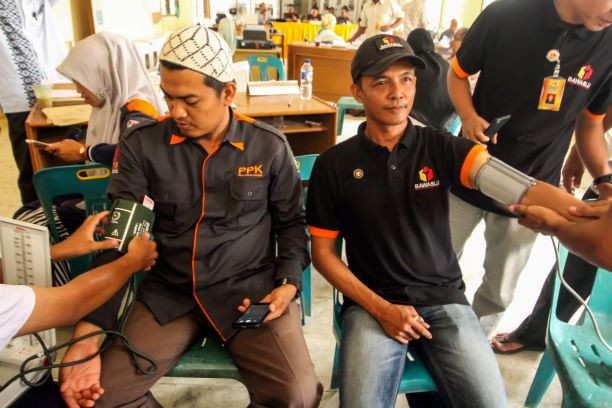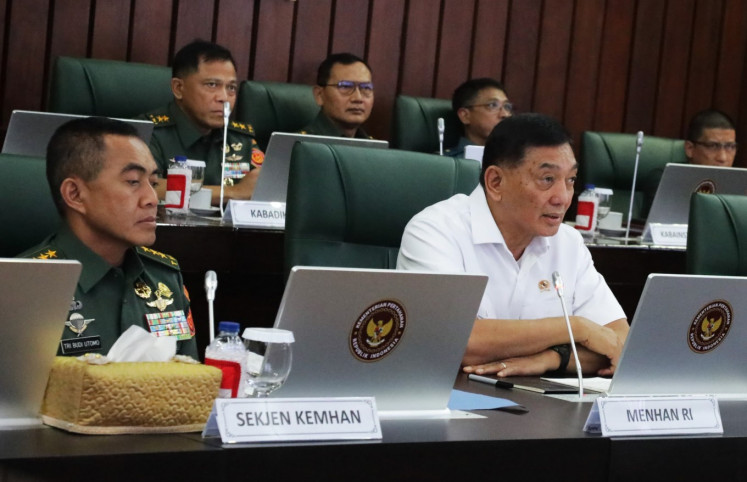Popular Reads
Top Results
Can't find what you're looking for?
View all search resultsPopular Reads
Top Results
Can't find what you're looking for?
View all search resultsVoting-made-easy has a cost: Over 400 deaths
Unfortunately, this time democracy comes with a big price tag. The death toll among polling station workers brought the nation’s attention to the brutal and arduous work they endured.
Change text size
Gift Premium Articles
to Anyone
 Medical team from Lhokseumawe Police in Aceh check the health of polling station working committee (KPPS) officers in Muara Dua district office in Lhokseumawe, Aceh on Wednesday, April 24, 2019. The checkup was taken to all officers including KPPS, security personnel, district election commitees (PPK), members of regional election supervisory committee (Panwaslu) and witnesses following a surge of elections officers who died and gotten ill from exhaustion during their duties on April 17 poll day. (Antara/Rahmad)
Medical team from Lhokseumawe Police in Aceh check the health of polling station working committee (KPPS) officers in Muara Dua district office in Lhokseumawe, Aceh on Wednesday, April 24, 2019. The checkup was taken to all officers including KPPS, security personnel, district election commitees (PPK), members of regional election supervisory committee (Panwaslu) and witnesses following a surge of elections officers who died and gotten ill from exhaustion during their duties on April 17 poll day. (Antara/Rahmad)
T
he April 17 general election may have been peaceful and orderly but it still goes down as one of the bloodiest in Indonesia’s history, with the death of more than 400 polling station workers.
Indonesia does not have a history of election violence, and this year is no exception, in spite of the brutal exchange of words between candidates and parties in their campaign.
The nation should take pride that they have held their fifth democratic, free and fair elections since 1998. The reported 80 percent turnout this year is testament to people’s faith in democracy.
Unfortunately, this time democracy comes with a big price tag. The death toll among polling station workers brought the nation’s attention to the brutal and arduous work they endured.
Before this, their contribution to the success of Indonesia’s elections has been underestimated and underappreciated. Judging by the cold reactions as if this is the price to pay for democracy, many people, including those in government, still do not understand the work involved.
The elections would not have been possible without the work of these workers. They are ordinary people recruited from local neighborhoods who dedicated their time and energy.
The General Elections Commission (KPU) made sure that voting was as easy and convenient as possible, limiting the number of voters to no more than 300 for each polling station to administer the five elections: President/vice president, House of Representatives, Regional Representatives Council, provincial-level legislative council and regency/city-level legislative council.
More than 800,000 polling stations nationwide were set up for the 192 million registered voters, and with each station run by nine people, the KPU relied on the work of more than 7.2 million volunteers.
For most voters, getting to the polling station required a mere few minutes of walking. Typically a voter spent no more than 10 minutes waiting and casting the five ballot papers.
There were no scenes of long lines of people waiting to vote. In countries with large concentrations of Indonesians, such as in Singapore and Sydney, Indonesians waited up to five or six hours to vote because the embassy could only open one polling station. But not in Indonesia.
Since the government declared voting day a national holiday, many voters enjoyed the rest of the day, taking advantage of the generous discounts from eateries in big cities like Jakarta.
We could not have made it easier for people to vote.
But now we have learned that “voting-made-easy” has its costs: The death of volunteers, mostly caused by exhaustion. More than 400 at the last count, including around 90 who died while working, and hundreds more still recovering in hospitals.
On April 17, volunteers typically spent 20 hours working non-stop, many going beyond 24 hours, far beyond what a normal human being can endure. Everyone was exhausted.
Besides administering the votes, they had to count all five ballot boxes. And they had to fill in multiple reports to the KPU. Their work began the day before, when they had to set up the tent, chairs, tables and other props. A few days earlier, they wrote the invitation to vote to the 300 people registered at their polling station, and hand delivered them door-to-door.
Did the volunteers know what they were getting into when they signed up?
Many did, from experience in administering past elections. They knew it so well many swore they would not do it again. Yet, they signed up because the subdistrict office begged them since no one else wanted to do it. Others who had no prior experience had no idea what they were getting into, and were physically unprepared.
Running a polling station was not a difficult or complex job, but it was arduous and physically taxing. The requirement for the job was a high school diploma. They were given a brief workshop on how to run the polling station and fill in the forms.
A few days before D-Day, the KPU asked the volunteers to produce a doctor’s certificate to say they were fit. At short notice, most were told to obtain it from local community health centers. For a small fee, without going through the check up, they got the letter declaring they were fit. The KPU has protected itself.
Most commentators with little idea of the work involved were quick to blame the decision to hold the presidential and legislative elections simultaneously. Naturally, they propose that the elections be held separately in 2024 as in past elections.
But that would only mean volunteers having to work twice as much next time around. Going by the death toll in 2019, it is unlikely that the KPU will be able to recruit as many volunteers, not for one round of elections, let alone for two.
The work of polling station workers could have been made much easier if Indonesia allowed for electronic voting. India, with five times the number of voters, has used e-voting that seemed fair and without evidence of massive fraud. Even without e-voting, much of the work in 2019 could have been made simpler with computers. Instead, the KPU insisted on volunteers doing everything manually.
With e-voting, the KPU still needs volunteers to run the polling stations in 2024, but with computers, their work would be so much simpler and far less taxing than the current analog system. We can even include all the other elections — gubernatorial and regency/mayoral elections — as previously planned to cut the huge costs of running so many elections in this country.
We should continue to make voting as easy as possible for people but we can also make administering the elections much easier, in the name of democracy.
***
The writer, a senior journalist, survived running a polling station in South Jakarta









